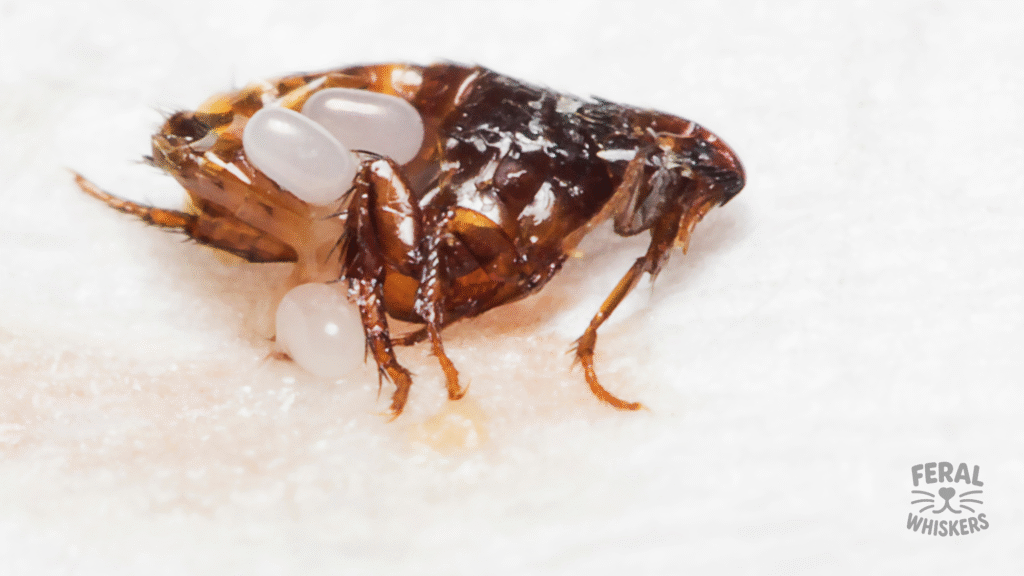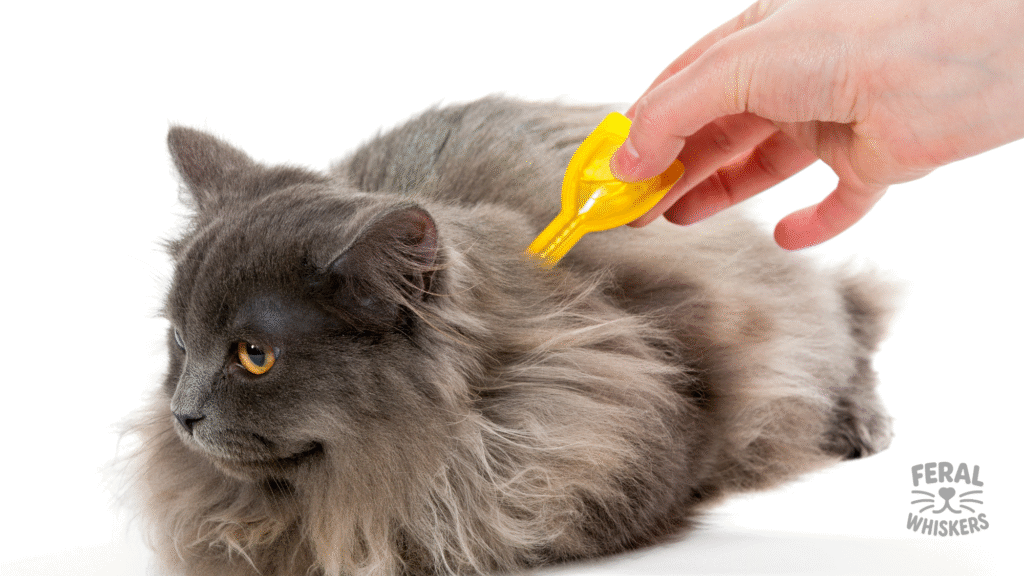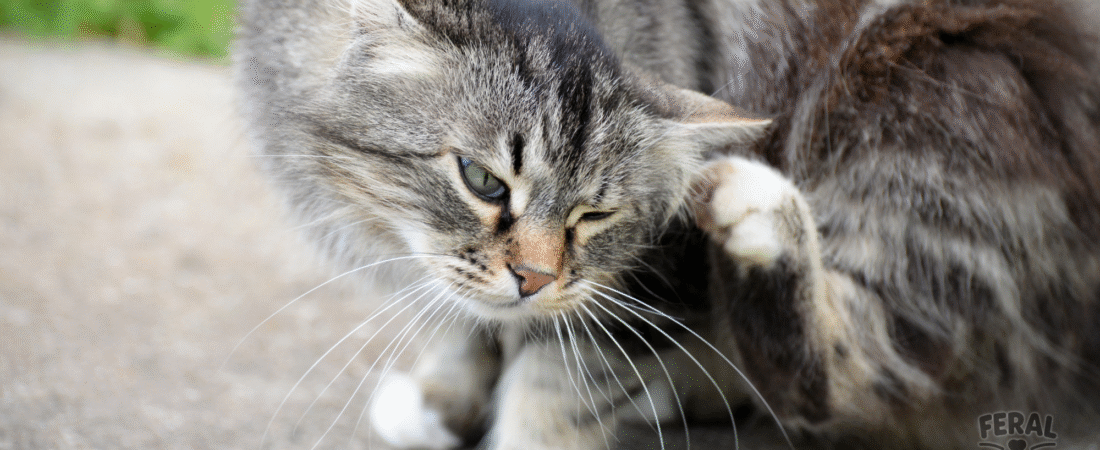📌 What Are Fleas?

Fleas (Ctenocephalides felis) are tiny, wingless insects that live by feeding on blood. They are the most common external parasite in cats worldwide.
- Size: Just 1–3 mm, but capable of jumping 100x their size.
- Life cycle: Egg → Larva → Pupa → Adult. Most of the flea population (eggs/pupae) live in your cat’s environment, not on the cat.
- Why dangerous:
- Cause intense itching, skin infections, and hair loss.
- Can trigger flea allergy dermatitis (FAD).
- Transmit tapeworms (cats swallow fleas during grooming).
- In kittens: heavy infestations → life-threatening anemia.
🦠 How Do Cats Get Fleas?
- Contact with infested animals (cats, dogs, wildlife).
- Environment: Flea eggs or larvae in carpets, bedding, soil, or furniture.
- Indoor cats are not safe: Fleas can hitchhike indoors via humans, other pets, or even open windows.
🚨 Symptoms of Flea Infestation in Cats
- Intense scratching, licking, and chewing at skin.
- Hair loss (especially around tail base, neck, belly).
- Red, irritated skin or scabs.
- Black “flea dirt” specks (flea feces) visible on skin/fur → turns red when wet (dried blood).
- Restlessness, agitation.
- Pale gums (sign of anemia in severe infestations).
💡 Some cats develop flea allergy dermatitis (FAD) → hypersensitivity to flea saliva = extreme itching from even 1 bite.
🔍 Diagnosis
- Flea Comb Test: Brush cat with fine-toothed flea comb → see fleas or black dirt.
- Visual signs: Jumping fleas visible in heavy infestations.
- Vet Check: Especially if suspecting anemia, dermatitis, or secondary infections.
💊 Veterinary Treatments for Fleas

Modern vet-approved products are safe, effective, and fast.
- Topical treatments (monthly):
- Selamectin (Revolution®)
- Fipronil (Frontline®)
- Imidacloprid (Advantage®)
- Oral treatments:
- Nitenpyram (Capstar®) → kills fleas within hours, but short-term.
- Spinosad/Spinetoram (Comfortis®, Cheristin®) → monthly protection.
- Combination treatments: Kill fleas, eggs, larvae, and also prevent worms.
⚠️ Never use dog flea products on cats — many contain permethrin, highly toxic for felines.
🌿 Holistic & Natural Remedies
While not replacements for vet treatment, holistic supports can relieve symptoms & reduce infestations:
- Apple cider vinegar (diluted spray): Natural flea repellent (not a killer). 1 part vinegar to 2 parts water, spray lightly on fur.
- Coconut oil: Rub small amounts into coat → repels fleas, soothes itchy skin.
- Neem oil (properly diluted): Natural insect repellant (vet-guided only).
- Food-grade diatomaceous earth: Sprinkle in bedding/carpets → dries out flea eggs/larvae.
- Herbal flea collars (cedar, lavender): Must be cat-safe; avoid strong essential oils (toxic).
💡 Holistic helps with comfort and environment, but only vet medicine clears infestations safely.
🏡 Home & Environmental Control
Since 95% of fleas live in the home (eggs, larvae, pupae):
- Wash bedding & blankets weekly in hot water.
- Vacuum carpets, rugs, furniture daily → kill eggs & larvae.
- Dispose of vacuum bags immediately.
- Steam clean carpets for deeper kill.
- Treat all pets in the home simultaneously to break the cycle.
🛡️ Prevention
- Year-round flea prevention = safest strategy.
- Regular grooming and flea comb checks.
- Keep indoor environment clean.
- Discourage stray animals from bedding near your home.
🌱 Quality of Life Impacts
- Fleas reduce comfort, sleep, and play.
- Allergic cats suffer worse reactions, often developing infections.
- Severe infestations in kittens can lead to anemia and death if untreated.
❓ FAQs
Q1: Can indoor cats really get fleas?
Yes — owners bring them in on shoes/clothes, and fleas easily move through cracks/windows.
Q2: Can I just bathe my cat to kill fleas?
Bathing may kill some fleas, but it won’t clear the life cycle. Eggs and larvae in the environment will reinfest.
Q3: Are essential oils safe for flea control?
No. Many (like tea tree, eucalyptus, pennyroyal) are toxic to cats. Always use vet‑approved or gentle holistic remedies.
Q4: Should I treat my home if I only see a few fleas?
Yes. Even one flea means 100+ eggs already in your environment.
💡 Final Thoughts
Fleas are small but can cause massive problems for cats — from skin irritation to life-threatening anemia.
✅ Best approach:
- Use vet-approved flea medications.
- Support with natural remedies for comfort.
- Deep-clean the environment to break the cycle.
Key takeaway: Preventing fleas is easier and safer than fighting infestations.

